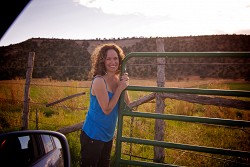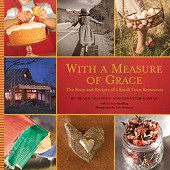Coming Home
by Lavinia Spalding (google+)It’s six-thirty in the morning, still dark, and I’m tiptoeing across my older sister’s living room, avoiding the places that creak. I’m sneaking out of her house, off to work the breakfast shift at the restaurant. I inch open the front door and am nearly outside when I hear her faint, sleepy voice call out.
“Bye, honey,” she says, her voice a blend of apology and gratitude. It’s the same thing each time I work this shift—no matter how quiet I am, she can’t sleep through my exit. And by this point it’s become almost a challenge to me, though I realize it’s probably hopeless. Blake knows I’m the anti-morning person, that I have been my entire life. She knows that until I moved to Boulder from Korea two months ago to work at the restaurant, I rarely made it out of bed before noon. Furthermore, she recognizes herself as the force behind this upheaval in my routine, and she feels sorry about it.
I call out goodbye, my voice a blend of faked perkiness and sincere absolution. It’s ok, I attempt to communicate—you stay where you are. You’re tired. You work too much. Sleep.
Then I’m out the door, into my car. The road breathes out before me in total silence, and my headlights illuminate the tiny, beautiful world of lower Boulder. To my right, sandstone buttes like enormous caramel-cream cakes for giants, to my left, Annie’s fruit orchard where Blake and I occasionally pick apples to eat on our walks.

I learned to accept inclusion into a community where anonymity was not only out of the ordinary, it was virtually unattainable.
Even though I’ve been here only a few months, this drive, the easy one-mile cruise between Blake’s cottage and the restaurant, has become as familiar to me as any road I’ve ever known. While I’m at it, I could easily say the same about the town of Boulder.
I remember my first dinner shift at the restaurant—the clientele that evening a smattering of tourists and locals. By the end of the night I’d received a dinner invitation from a local couple, an offer of lodging by a girl from the next town over, a handful of tourists’ business cards, and the phone number of a customer’s single son. After residing most of my adult life in big cities where anonymity was practically an ordinance, this sudden outpouring of love and attention was somewhat confusing. Was it for real, I wondered? Would it be this way every night?
It was for real, I would discover, and yes, it would be this way nearly every day and night. And what’s more, I would even sort of get used to it.
Over the following months I learned the local wave, the one executed from your automobile as a greeting to any oncoming vehicle (the key to a perfect Boulder wave, I’d been coached, was to look casual, which meant never actually lifting your hand from the steering wheel). I learned the names of Boulder’s children, its dogs, horses, even its pet pigs. I learned to stop locking my car and to leave the key in the ignition, because that way you never had to look for it; you always knew where it was. And gradually, I learned to accept inclusion into a community where anonymity was not only out of the ordinary, it was virtually unattainable.
Pulling into the driveway of the restaurant, I spot the remnants of last night’s Fourth of July festivities. Flags poke patriotically out of the fence on the grounds in front of the restaurant, and the stage is still standing where the town talent show was held. (All Blake’s stereo equipment remains there as well, having spent a peaceful, quiet night on the lawn.)
Every year the restaurant hosts an ice cream social, but this year Blake and Jen decided to put on a talent show as well. Concerned that the number of participants might be skimpy, they urged all their employees to compete. (As it turned out, they needn’t have worried—just about the whole town came out.) I chose to play the guitar. I had my misgivings (a lifetime of stage fright will do that to a person), but in the end I agreed. After all, I reasoned, this was Boulder, Utah, population 180: surely a forgiving venue. I hadn’t lived here long enough for most people to know me, and the few who recognized me would hardly remember the next day if I made a few mistakes. I practiced my guitar for about an hour and got up on stage. Halfway through my piece, I forgot what I was playing, froze and stopped.
“I’m sorry,” I said, and, mumbling something incoherent about stage fright, ran offstage.
Oh well, I thought. That was embarrassing.
The restaurant is still dark when I arrive, and completely quiet. I flip on the lights and start the coffee. After a few minutes, Jennifer Davis arrives to do the cooking. Little Jenny D, as we call her, was Blake and Jen’s first employee, and at the restaurant is unanimously adored. I let her choose the opening tunes (she picks a Top 40 mix, cranking songs by boy bands and fast-forwarding through any containing adult lyrics), and she lets me eat the first, trial, blue-corn pancake of the day. It’s our usual routine.
At seven o’clock sharp, my first customer arrives. She’s an older woman with gray hair. She waves and smiles at me, and looks vaguely familiar. A local, I assume, or a lodge guest I’ve served a few times. When I bring her coffee, she puts her hand gently on my wrist.
“Honey,” she says, “You sounded so good last night. I just have to tell you, I think you’re awfully brave getting up there when you have stage fright.” I mumble an embarrassed “thank you” and attempt to leave. Apparently unaware of my desperation to escape, however, she goes on a bit, so that when the next customers arrive I practically sprint to their table.
Except they have a similar opening line.
“You should’ve kept playing last night!” they exclaim. “It was wonderful! How did you learn to play the classical guitar? How long have you been playing?”
At this point I decide to spend my morning hiding in the kitchen. I will come out only when absolutely necessary.
By the time my shift ends at 2:00, a total of seven tables have delivered addresses on my botched performance, offering up everything from encouragement to commiseration to tips on combating performance anxiety. I’m relieved to be off work. I plan to disappear for the rest of the day, but before that happens I need to stop by the post office. As I get out of my car and am heading to the mail box to drop off a letter, a woman I’ve never seen before in my life suddenly halts her pickup truck in the middle of the road, gets out and hurries around the front of the truck.
“I have to tell you,” she calls out to me. She plays the organ, it seems, in the church here. And she has these people trained. These Boulder ears are used to hearing mistakes. They would’ve never known. She is of the opinion that I should have kept playing.
Finally, I’m back in my car. I have my mail and am en route back to Blake’s, down the same familiar road. As I round the corner where this morning I saw the deer, I pass a neighbor from up the road. We both do the steering wheel wave, but then he slows down, stops, rolls down his window and tells me what he thinks.
As we say goodbye and I drive on, I realize I’m smiling. Then I realize I’m home.
